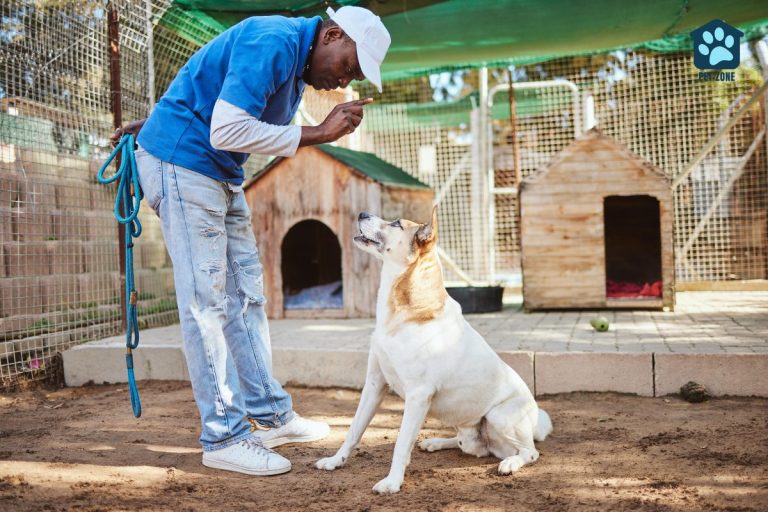If your dog suddenly starts flinching, there could be a range of reasons behind this behavior. Whether it’s due to pain from an injury, the onset of seizures, vision problems, or exposure to toxins, understanding the cause is crucial. Nerve irritations, allergies, and other medical conditions might also make your dog flinch unexpectedly. It’s essential to identify the root of the issue and consult a veterinarian for proper guidance and care.
Estimated reading time: 7 minutes
Every dog owner’s worst nightmare is noticing a sudden change in their pet’s behavior. When you may notice your dog flinching all of a sudden, it can set off alarm bells in your head. It could be just a quirky behavior–or it could be a sign of an underlying issue.
Reasons Why Your Dog is Flinching All of a Sudden
Whether it’s due to sudden movement, a loud noise, or no apparent reason at all, understanding why your dog may be flinching can help you get to the bottom of the issue. In this article, we’ll dive deep into the possible causes of sudden flinching in dogs and provide guidance on what a dog owner should do next.
Injury or Pain
When a dog suddenly starts flinching, one of the first things to consider is pain or injury. Just like humans might flinch away from objects or movements when they’re hurt, dogs have the same involuntary reactions.
If your dog is flinching when you touch a specific part of their body, it might indicate soreness or discomfort in that area. For instance, a sprained leg or an unnoticed thorn might be causing your dog to flinch.
Also, if your dog isn’t just flinching but acting strangely or appears lethargic, it’s best to consult a veterinarian. Internal injuries or ailments might not be visible to the naked eye, but they can make your dog act out of character. It’s crucial as a responsible dog owner to ensure that your dog isn’t suffering silently.
Fear or Anxiety
Dogs, just like people, experience emotions. A dog may flinch if they’re scared or anxious. Think about it: if something startles you, you’d likely flinch, right? It’s the same for our furry friends.
Some dogs might flinch due to past traumas, loud noises, or unfamiliar surroundings. They could be flinching away from people and other dogs if they had a bad experience in the past.
Moreover, if you notice that your dog is suddenly flinching when exposed to new environments or situations, it might be due to anxiety. Building trust and bonding is key. Positive reinforcement can help your dog become more confident and less fearful.

Seizures and Neurological Disorders
Sometimes, what might look like a small flinch could be the onset of a seizure. Seizures in dogs can range from violent shaking to subtle signs like sudden flinching. Neurological disorders or abnormalities can cause your dog to flinch involuntarily.
It’s vital to differentiate between regular flinching and flinching due to a seizure. If your dog starts to flinch frequently and seems disoriented afterward, or if there’s drooling, a loss in the dog’s balance, or sudden unconsciousness, these could indicate seizures. Permanent damage to your dog can occur if seizures aren’t addressed.
If you suspect your dog might be experiencing seizures, take your dog to the vet immediately. The sooner you act, the better the outcome for your pooch.
Vision Problems
Have you ever been startled by a shadow or a sudden movement in your peripheral vision? Dogs experience this too. If you notice your dog flinching away from objects or lights, vision problems could be the reason.
Cataracts, retinal diseases, or other eye conditions can make them flinch at what seems like nothing to us. A clear sign is if your dog is flinching away from objects they used to navigate around easily. Think about it: a sudden decrease in vision can cause disorientation and make any quick change in their visual field a potential threat.
Ensuring regular check-ups and keeping an eye out for signs of vision issues can help diagnose and address problems early on. If your dog is suddenly flinching more than usual and you think vision might be the cause, it’s time to consult a veterinary specialist in ophthalmology.
Toxins
Dogs are curious creatures. Whether it’s a new plant in the backyard or an interesting-smelling item on the floor, they often explore with their mouths. Sometimes, this curiosity can lead them to ingest harmful substances.
If you notice your dog flinching randomly or acting out of the ordinary, toxins might be at play. Ingesting something they shouldn’t have can not only cause your dog to flinch but also cause lethargy, vomiting, or even more severe symptoms.
Common household items like certain plants, foods, or chemicals can make your dog suddenly ill. If you think your dog might have swallowed something toxic or if they’re flinching and acting weird, don’t delay. Take your dog to the vet right away. Quick action can prevent more serious health issues and ensure that your dog remains safe.
Nerve Irritation
Imagine a tingling sensation or sudden jolt of pain – that’s what nerve irritation might feel like for your dog. If your dog starts flinching due to seemingly no external factors, nerve issues could be at play.
Neck or back problems can cause involuntary flinching, especially when the dog moves in a particular way. For instance, a herniated disc or pinched nerve can cause your dog to flinch or even yelp when they move or when touched.
Wobbly movements, hesitation in jumping, or changes in posture can accompany this type of flinching. If you suspect nerve issues or if your dog is flinching due to pain, get your dog checked by a vet. They can recommend treatments or therapies to alleviate discomfort and get your four-legged friend back to feeling their best.
Allergies and Other Medical Issues
Allergies aren’t just a human problem; dogs can suffer from them too. Itchy skin, rashes, or even internal discomfort can make your dog flinch. If your dog suddenly starts scratching more, has patches of red skin, or is flinching randomly, allergies might be the culprit. External factors like flea infestations or mange can also cause your dog to flinch, especially if they bite or irritate the skin.
Beyond allergies, other medical conditions might cause flinching. For example, dehydration can lead to disorientation, making a dog more likely to flinch. Deeper internal problems, infections, or diseases can also cause your dog to act out of the ordinary.
As a responsible dog owner, if you notice behaviors in your dog that shouldn’t be dismissed, such as flinching when you know they’re not in pain or scared, it’s best to take them to the vet for a thorough check-up. Early detection can make all the difference in treatment and recovery.

Flinching in Dogs: Next Steps and Veterinary Guidance
As a dog owner, seeing your pooch flinch can be concerning. Flinching can stem from various causes, from the simple startle at a sudden movement to something more serious like neurological disorders. Understanding the possible causes and being observant can help you get to the bottom of why your dog may be flinching.
Always prioritize your dog’s well-being. If you’re unsure or concerned about any behaviors in your dog, especially sudden flinching, don’t hesitate to consult a veterinarian. They can provide guidance, run necessary tests, and ensure that your pet gets the best care possible.
Remember, as a dog owner, you’re your pet’s first line of defense. Your attentiveness and quick action can make a world of difference in ensuring their health and happiness.
Join the conversation below in the comments and share this article with fellow dog lovers to spread the knowledge!
As an Amazon Associate I earn from qualifying purchases.










The parallels you draw between human reactions and those of dogs are thought-provoking. It’s fascinating how similar their responses to pain, fear, and anxiety can be to ours. Your explanation of potential reasons for flinching, such as injury, fear, seizures, and vision problems, is not only educational but also empathetic in highlighting the importance of responsible pet ownership.